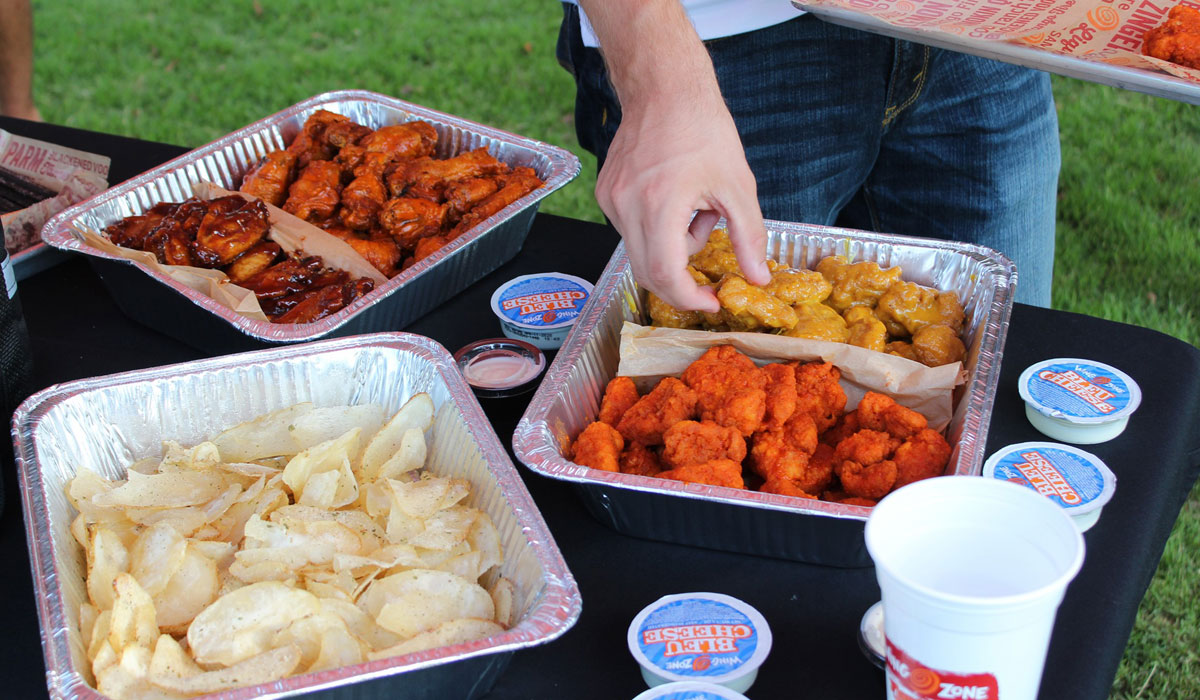Wing Zone started 25 years ago with takeout and delivery in its DNA.
So as dining rooms began to shut down across the nation, co-founder and CEO Matt Friedman says Wing Zone, which has nearly 100 U.S. units, became the go-to restaurant for many consumers. In the past few weeks, same-store sales have jumped 40 percent.
The only thing Friedman can compare it to is the sales surge during Super Bowls compared to the week prior. He describes the growth as unprecedented and staggering, especially considering that many units are in quiet college markets.
“I think a lot of it had to do with the stimulus checks,” Friedman says. “I think a lot of it also just deals with we’re in the right type of price point for a lot of consumers out there, and the fact that we offer direct delivery, not just third-party. And then we added curbside to our arsenal.”
Friedman says that before COVID-19, it was difficult finding delivery drivers because of the demand from third-party companies and ride-share businesses. But the pandemic has opened up the labor pool in a significant way. To meet the demand for delivery, the company has added as many as 200 jobs.
Friedman says Wing Zone’s ability to put people to work is probably what the company is most proud of during the pandemic. He describes the training process as brief—drivers are getting on the road and making money quickly.
“Although they get an hourly wage, a lot of their income is paid daily in cash,” Friedman says. “So for us, it’s not like hiring a manager or a cook or something that we really need to train a lot on. … For some of these people, maybe they’re going to be with us for 30 days or 90 days. Some may stick with it longer. But it’s been really nice to be able to put a message out there of hiring drivers, earn $15 to $20 an hour, and actually get a nice flow of applications.”
Looking ahead into the post-pandemic world, Friedman expects Wing Zone’s direct delivery model to lift the brand past the competition.
Friedman says restaurants claim to be in the delivery business, but they’re really outsourcing. Ultimately, there’s a debate about who the customer will remain loyal to, and Friedman believes it’s the third party.
The pandemic has only fanned the flames in regard to the tension between restaurants and companies like Grubhub, DoorDash, and Uber Eats. Restaurants have repeatedly complained about the high fees, saying they eat into margins that are already razor thin. For example, Andrew Rigie, executive director of the New York Hospitality Alliance, described Grubhub as “fear mongers” and said many operators refer to the company as evil.
San Francisco and Seattle both introduced an emergency 15 percent cap on delivery fees. L.A., Chicago, and New York are all considering similar measures. Chicago’s legislation is the most extreme, with a proposed 5 percent cap.
Meanwhile, Wing Zone prides itself on food coming from a Wing Zone driver with a uniform and hot bag, the CEO says.
“I would say one of the most impactful things that has happened with us with COVID-19 is we control the experience,” Friedman says. “If we mandate that every driver has to wear a mask or have gloves or its contactless payment, then we’re controlling that experience. It appears to me that the consumer is trusting dealing with the brand directly rather than through a third-party.”
“The fact is, is that the third parties are charging 30 percent of the order,” he continued. “You tell people that aren’t in the restaurant segment that they’re taking 30 percent off the top, their jaw hits the ground because they’re like, ‘Well how do you make money?’ Well the fact is, controlling our own direct delivery is a more profitable model for us.”
Friedman believes Wing Zone’s strong margins during the pandemic will position the brand as an attractive investment opportunity for potential franchisees.
With the economic downturn and less competition filling the market, rent, real estate, and construction costs are expected to favor investors, which will lead to aggressive opportunities. Friedman says 2021 looks promising for new store openings.
“I think we’re going to see a surge in franchising,” Friedman says. “And I think we’re going to see a surge in specific brands that are, I hate to use the word essential, but one that fits where this world is going to go for maybe the next one to five years. Convenience is big. Where is the right price point, delivery? What are some things that people will enjoy in their homes?”
Friedman says the key to developing trust amid the pandemic has been leaning on leadership and communication through public service announcements highlighting safety measures. He’s encouraged franchisees to increase their social media presence to give their store a more personalized approach.
“During this time, I think people really want to understand, this is not just about business,” Friedman says. “It’s about that relationship. I think for us and our franchisees, it has just been about constant communication, not only from us to our franchisees, but from us to our consumer and then continuing to have strong leadership as to what we are doing and how do we handle it.”

